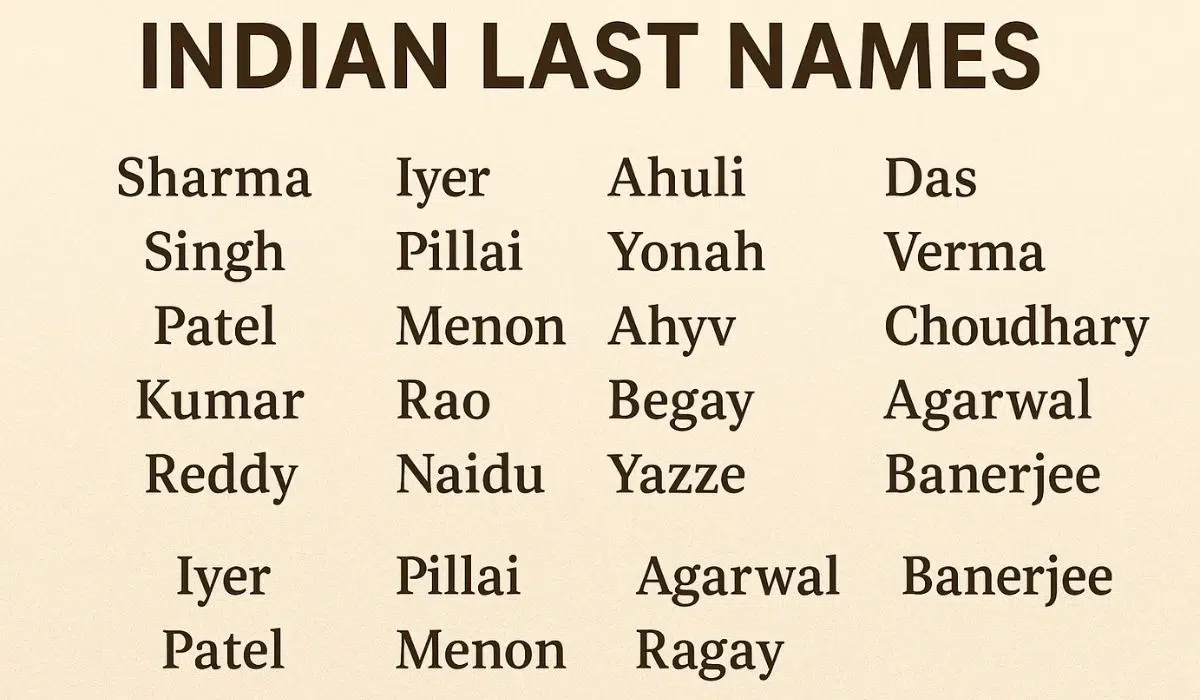Indian Last names are more than just identifiers—they reflect a person’s cultural roots, caste, profession, region, and even community traditions.
With India’s diversity, surnames carry deep meanings that connect families to history, geography, and ancestry.
From common Indian last names like Sharma, Singh, and Patel to unique tribal and Native Indian last names, each has its own story to tell.
In this article, we will explore the most common Indian last names, regional differences, caste-based surnames, as well as connections to Native American and tribal names, including Cherokee Indian last names and Yaqui Indian last names.
Also read- Hindu Vedic Names
Common Indian Last Names
Some surnames are so widespread in India that they instantly identify heritage and community. These include:
- Sharma – Common among Brahmins, denoting respect for teachers and priests.
- Singh – Widely used in northern India, particularly among Rajputs and Sikhs, meaning “lion.”
- Patel – Prominent in Gujarat, originally meaning “village headman.”
- Kumar – A general surname often used as a suffix for males across India.
- Reddy – Popular in Andhra Pradesh and Telangana, linked to the landowning caste.
These are among the most common Indian last names found across states, often transcending caste and religion in modern times.
Popular Indian Last Names
The popularity of last names often depends on the region:
- South India: Names like Iyer, Pillai, and Menon dominate Kerala and Tamil Nadu.
- North India: Gupta, Verma, and Choudhary are widely used.
- West India: Deshmukh, Kulkarni, and Joshi are notable in Maharashtra.
- East India: Surnames like Das, Banerjee, and Chatterjee are highly common in Bengal.
These popular Indian last names reveal how regional languages and occupations shaped surnames.
Indian Last Names by Caste
Caste has historically influenced surnames in India. Examples include:
- Brahmin Last Names: Sharma, Bhattacharya, Iyer.
- Kshatriya Last Names: Singh, Chauhan, Rana.
- Vaishya Last Names: Agarwal, Gupta, Shah.
- Shudra & Other Castes: Yadav, Kurmi, Jatav.
Though caste-based distinctions are less emphasized today, Indian last names by caste still indicate ancestral professions and communities.
South Indian Last Names
In southern India, surnames often differ from the northern style. Instead of family names, many people use their father’s name, village name, or caste identity. Some common South Indian last names include:
- Rao – Found in Andhra Pradesh and Karnataka.
- Pillai – A respected surname in Tamil Nadu and Kerala.
- Naidu – Historically associated with leaders and landowners in Andhra.
- Menon – Linked to administrative families in Kerala.
American Indian Last Names and Native Indian Last Names
While India has its own surname traditions, “Indian last names” are also associated with Native Americans due to historical naming. Examples of American Indian last names include:
- Yazzie – Meaning “little one,” common among the Navajo tribes.
- Begay – Refers to “his son,” another Navajo surname.
Similarly, Native Indian last names from tribes across America—like Lakota, Apache, or Sioux—carry meanings rooted in nature, family, or profession.
Cherokee Indian Last Names
The Cherokee people, one of the largest Native American tribes, have distinctive surnames with deep meanings. Common Cherokee Indian last names include:
- Ahuli – Referring to a drum.
- Yonah – Meaning “bear.”
- Ahyv – Representing strength or bravery.
These names highlight cultural traditions, much like Indian surnames linked to caste or occupation.
Yaqui Indian Last Names
The Yaqui are an indigenous people from Mexico and the United States. Common Yaqui Indian last names include Valenzuela, Flores, and Miranda.
Many of these names were influenced by Spanish colonization, but still connect to tribal identity.
Long Indian Last Names
Some Indian surnames are remarkably long due to their linguistic structure or ancestral lineage. Examples include:
- Venkatanarasimharajuvaripeta (considered one of the longest place-based surnames).
- Chaturvedula and Viswanathan are also lengthy South Indian last names.
These long Indian last names often carry multiple references to lineage, village, or profession.
Indian Last Names and Meanings
Every Indian surname has a meaning attached to it:
- Sharma – “Joy” or “prosperity.”
- Patel – “Village headman.”
- Das – “Servant of God.”
- Verma – “Armor” or “protection.”
- Reddy – “Village chief.”
Understanding Indian last names and meanings helps trace back family history and origins.
Most Common Indian Last Names in the US
With the Indian diaspora spread globally, certain surnames are very common among Indian-origin families in the United States. The most common Indian last names in the US include:
- Patel
- Singh
- Shah
- Reddy
- Iyer
These reflect the migration of Gujaratis, Punjabis, and South Indians to America, especially after the 1960s.
FAQs
What is the most common Indian last name?
The most common Indian last names are Singh, Sharma, and Patel, widely used across multiple states and communities.
Do Indian last names always indicate caste?
Not always. While many surnames historically represented caste, today they are more about family heritage and identity rather than strict caste divisions.
Why are South Indian last names different from North Indian ones?
South Indians often use village names, father’s names, or ancestral references instead of a fixed family surname, unlike the North Indian system.
Are American Indian last names related to Indian surnames?
No. American Indian or Native Indian last names come from indigenous tribes in the Americas, while Indian surnames are from South Asia. The similarity is due to historical naming confusion.
What are some long Indian last names?
Examples include Venkatanarasimharajuvaripeta, Chaturvedula, and Viswanathan, which often combine multiple linguistic or ancestral elements.
